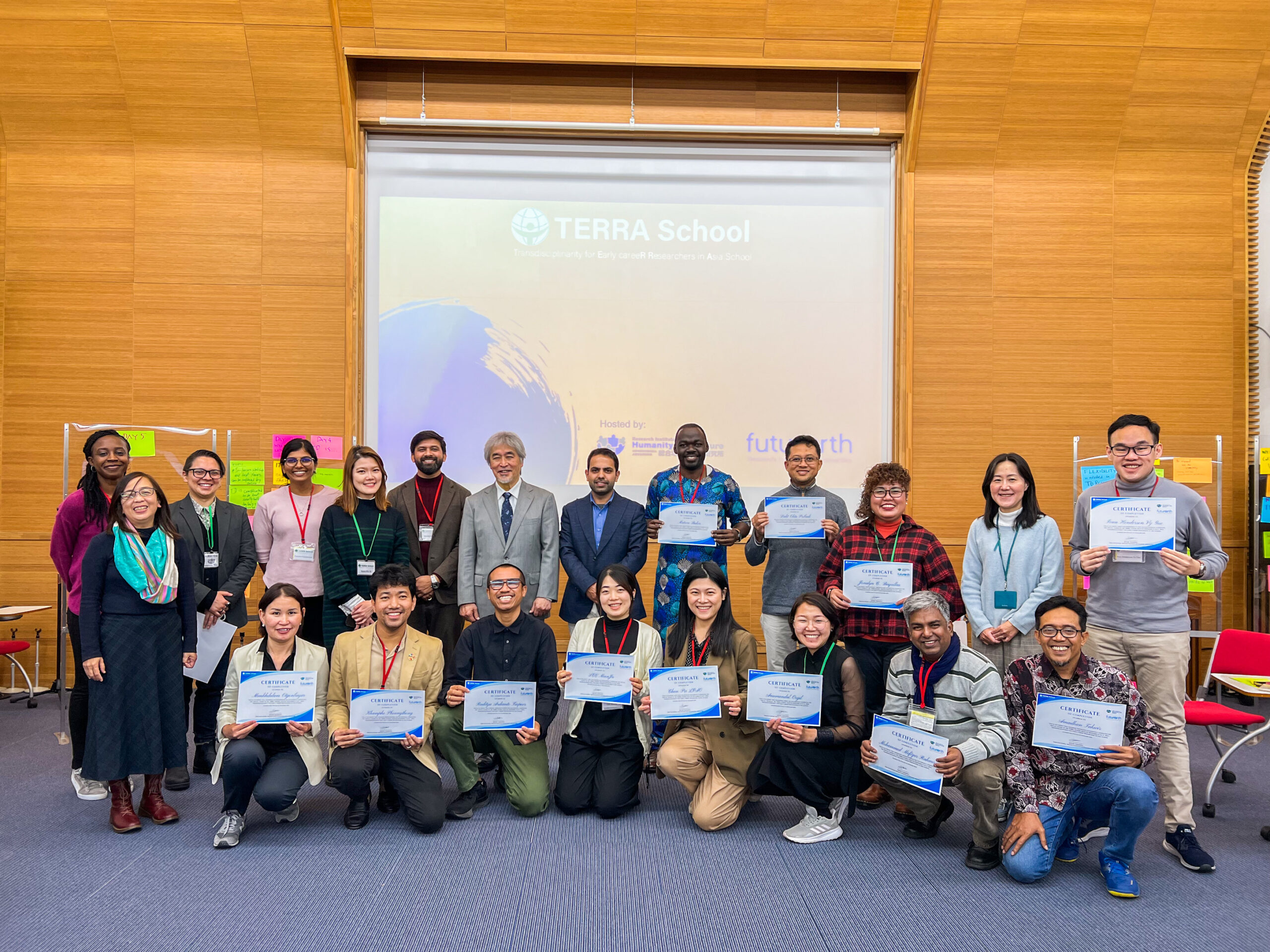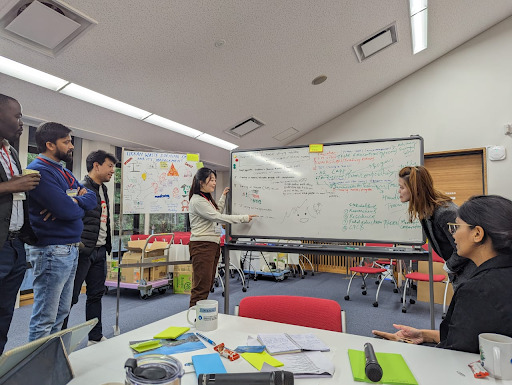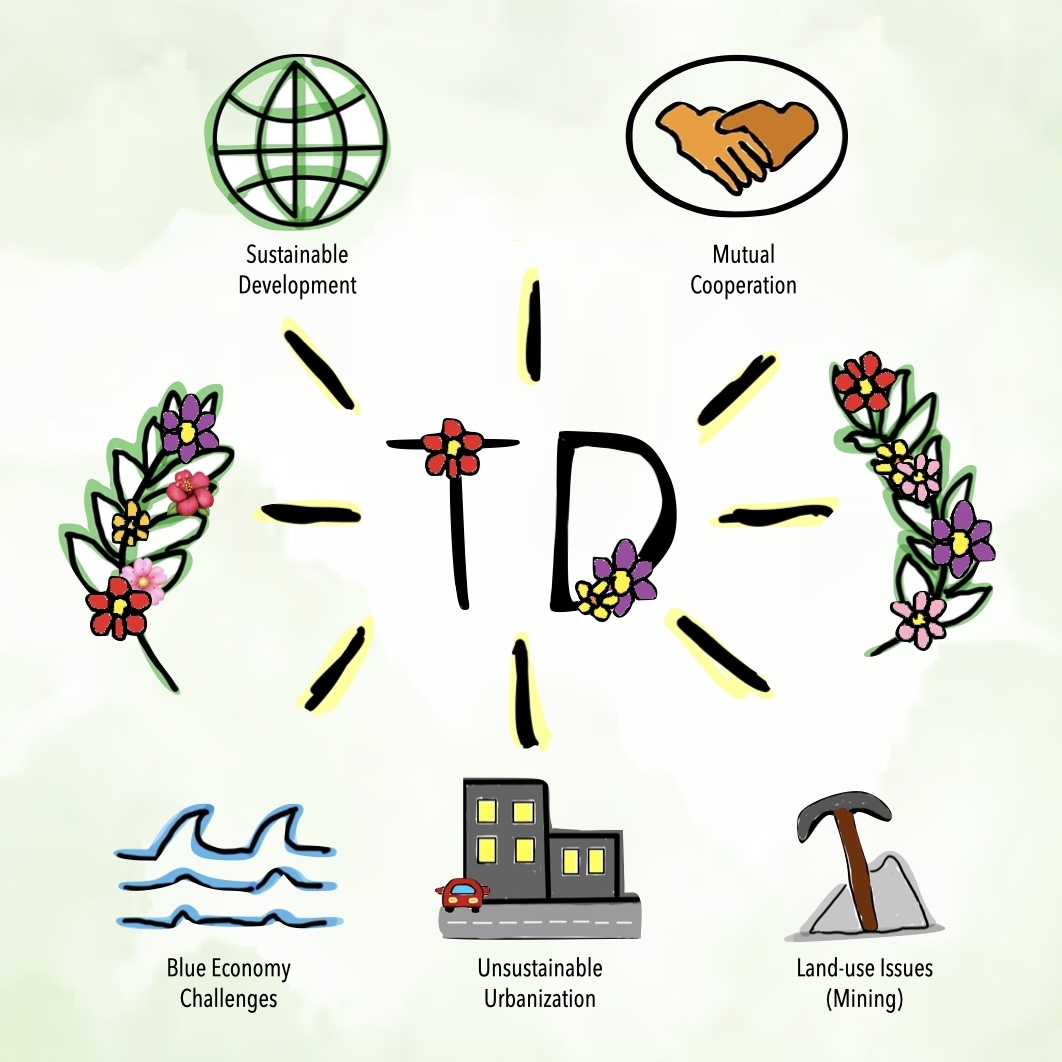The TERRA School Experience: Transdisciplinarity as a Solution to Complex Societal Issues

Transdisciplinary research (TD) was at the core of our TERRA School experience.
Early career researchers in various fields with multicultural backgrounds – 17 participants from 12 countries – convened at the Research Institute for Humanity and Nature in Kyoto, Japan. During the five-day intensive course, we immersed ourselves in the discipline of TD, and we share below our vision of how TD can provide solutions to complex societal issues in our respective countries.

INDONESIA: Co-designing for a transdisciplinary vision
Raditya Ardianto Taepoer
In envisioning the future of transdisciplinary initiatives in Indonesia, a pressing sense of urgency emerges to address society’s intricate challenges. The transdisciplinary approach becomes imperative, crucially breaking down the barriers isolating disciplines and stakeholders, fostering community resilience and social cohesion, and effectively addressing multifaceted problems. As an illustration, the three groups in this year’s TERRA School selected distinct locations in Indonesia, each addressing specific issues: densely populated urban areas and groundwater, sustainable land-use planning in nickel mining zones, and the conservation of coral reefs for life protection. In realizing Indonesia’s transdisciplinary vision, the co-designing phase engages stakeholders in understanding, envisioning, and formulating solutions to grasp issues fully. The co-production phase highlights interdisciplinary research, active multistakeholder participation, and the integration of Indonesia’s cultural value of mutual aid, known as gotong royong. Utilizing a portfolio approach aims to foster transformative change aligned with community aspirations to establish trust and facilitate mutual learning.
MALAYSIA: Fostering innovation and collaboration for biodiversity
Praneetha Palasuberniam
Transdisciplinary research in Malaysia is gaining momentum as the country recognizes the need for holistic and collaborative approaches to address complex societal challenges. Malaysia, with its rich cultural diversity and rapidly evolving economic landscape, is increasingly turning to TD to foster innovation and sustainable development. This approach goes beyond traditional disciplinary boundaries, encouraging researchers from diverse fields such as science, technology, social sciences, and humanities to collaborate on interconnected issues. One prominent example is the exploration of sustainable development in the context of Malaysia’s flora and fauna biodiversity, where scientists, social scientists, and policymakers collaborate to balance conservation efforts with economic development. The country’s commitment to TD is evident in the establishment of multidisciplinary research centers and the integration of diverse perspectives in national research agenda. The Malaysian government is actively promoting a culture of collaboration across institutions and disciplines, emphasizing the importance of integrating knowledge and expertise to solve real-world problems. As Malaysia continues to navigate the challenges of the 21st century, TD is proving to be a powerful tool for fostering innovation, driving sustainable development, and addressing the complex, interconnected issues that shape the nation’s future.
PHILIPPINES: Approaching societal challenges with transdisciplinarity
Ivan Gue and Jonna Baquillas
As a developing country, the Philippines is inundated with issues of poverty, inequality, and injustice.
Our initiation to transdisciplinary research in TERRA school introduced us to the importance of participatory approach and co-designing initiatives with key stakeholders. We realized that some of the pressing challenges we have in the Philippines can benefit from TD research – one of which is the looming transportation crisis. The “jeepneys”, being one of the main local public transportation serving most thoroughfares, are being phased out due to the jeepney modernization program. The current situation asserts that there is a lack of infrastructure for mass transport, making it difficult for daily commuters to travel and threatening the jeepney drivers with loss of livelihood due to the impending modernization.We envision that TD research can play a crucial role in this issue, given that its participatory nature can bring to light various approaches co-designed by different stakeholders, resulting in solutions and policies that are beneficial to everyone.
TAIPEI: Immersing in coastal communities for collaborative and inclusive solutions
Chun-Pei Liao
Taiwan’s commitment to achieving net-zero carbon emissions by 2050 is underscored by “12 Key Strategies ”Action Plan. Yet, the journey toward sustainability is riddled with challenges, notably in interdisciplinary research. Focused on coastal areas, our scientific teams, comprising experts from diverse fields, delve into communities to grasp real-world contexts. Effective communication post-research, translating complex findings into accessible language, is crucial for engaging stakeholders.
This intricate process requires robust interdisciplinary theoretical backing, coupled with innovative and efficient perspectives from each team. Taiwan’s pursuit of a sustainable society hinges on this collaborative effort, ensuring inclusivity and guarding against disparities. As we navigate this path, let us not merely meet policy objectives but foster a future that is both environmentally conscious and socially equitable.
UGANDA: Designing collaborative actions for ocean sustainability
Matovu Baker
Blue Economy (BE) is a new paradigm shift in the ocean discourse that envisions equity in resource sharing and just transitions in the global economy with a focus on sustainability in the utilization and management of marine resources. The attainment of BE targets is a complex process that requires a holistic understanding of the ocean system complexities and interactions to chart inclusive and sustainable pathways. The transdisciplinary approach envisioned at the TERRA school could be a key leverage point to this. One of the salient tenets of the approach is envisioning the use of collaborative models that call for holistic stakeholder inclusivity and perspectives, irrespective of the spatial-temporal dimension. In my research, this could be integrated with a Human-Centered Design to develop locally feasible solutions that empower vulnerable communities, especially women. This approach could be key in designing collaborative actions that align with ocean sustainability targets. The benefits of the transdisciplinary approach should be scaled up in the Future Earth hubs.
ENVISIONING TRANSDISCIPLINARY APPROACHES IN MODERN SOCIETY
TERRA School helped us understand the significant role that transdisciplinary research plays in ensuring inclusive and collaborative approaches to complex societal issues. Anchored on sustainable development and mutual cooperation among stakeholders, we envision TD as an actionable solution to some of the pressing problems we have highlighted – blue economy challenges, unsustainable urbanization, and land-use issues. We look forward to embracing opportunities for TD, so we may face societal problems as champions of synergistic actions, one solution at a time.
AUTHOR PROFILES
Baker Matovu
Baker Matovu is a Ph.D. in Sustainable Development researcher (focusing on Blue Economy and Empowerment of vulnerable people) at Amrita Vishwa Vidyapeetham, India. As an early career researcher under the ABCD Global Future Environment Leaders (FEL) program, Baker has passion for using systems thinking research and human-centered designs to identify complex problems in coastal-marine space interfaces to co-design innovations and local-led initiatives that increase resilience to both human-environmental shocks.
Chun-Pei Liao
Chun-Pei Liao is a postdoctoral research fellow from National Taiwan Ocean University. As a marine social scientist, her research interests lie in the interaction between coastal communities and natural resources. Much of her time is spent in fishing ports, where the pulse of marine conservation efforts beats the strongest. In these vibrant locales, she immersed herself in the everyday realities of those who depend on our vast oceans, gaining insights that transcend mere data and resonate on a deeply human level.
Ivan Gue
Ivan Gue is an early career researcher and an associate professor from the Department of Mechanical Engineering of De La Salle University in Manila, Philippines. He is also the current chairperson of the department. Ivan has extensive experience in the field of sustainable development where he had research and consultancy engagements in the fields of biofuels, sustainable transport, and circular economy. His primary research methods are in the use of computational tools, such as input-output analysis, life cycle assessment, machine learning, and multiple-criteria decision analysis.
Jonna Baquillas
Jonna Baquillas has a diversified professional portfolio and a Doctor of Business Administration degree. She is a Board of Trustees member of the Asia Pacific Roundtable for Sustainable Consumption and Production (Thailand) and currently teaches at the Department of Marketing and Advertising, De La Salle University (Philippines). She is actively involved in several interdisciplinary research projects on sustainable consumption and production, sustainable tourism, climate resilience, circular economy, and clean energy. She served as a consultant for various research and capacity-building projects under United Nations Environment Program, USAID, EU Switch Asia, OXFAM Philippines, New Zealand Aid Programme, and UNDP-Connecting Business Initiative.
Praneetha Palasuberniam
Praneetha Palasuberniam, an early career researcher with an MD and a PhD, is a Senior Lecturer at the Department of Biomedical Sciences, Universiti Malaysia Sabah, under the Pharmacology division. Armed with an understanding of both bedside patient care and intricate laboratory methodologies, Praneetha’s focus is on Pharmacology and Toxinology, and her most recent research involves the investigation of snake venom toxins and antivenoms in addition to mushroom toxins. Most recently, she was on a board of external consultants with the World Health Organization to understand other treatment modalities for snakebite envenoming besides the century-old antivenom.
Raditya Ardianto Taepoer
Raditya is currently pursuing a PhD at the System Planning Lab, Department of Design, Chiba University and is actively involved in d+ research+design, Design Ethnography Lab (DE:Lab) Institut Teknologi Bandung, and Research Center for Cultural and Environmental Products (PPPBL) Institut Teknologi Bandung. His research interests include service design, participatory design, and social innovation, focusing on exploring the role of design in addressing everyday issues from a grassroots perspective.
Transdisciplinarity for Early CareeR Researchers in Asia+ School is co-organized by the Research Institute for Humanity and Nature and Future Earth Japan Global Hub
DATE
January 19, 2024AUTHOR
Future Earth Staff MemberSHARE WITH YOUR NETWORK
RELATED POSTS
TERRA School 2023 参加者募集

